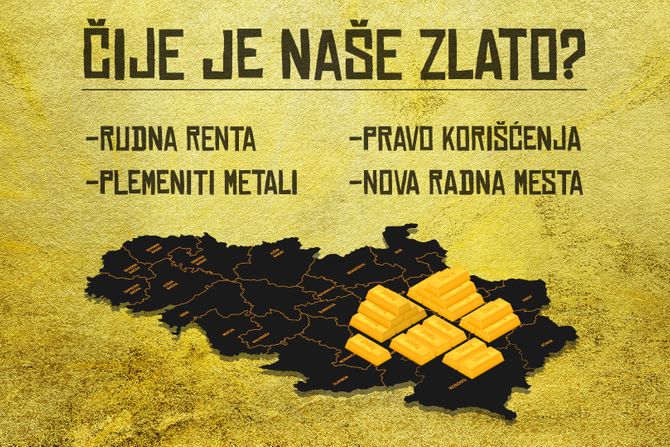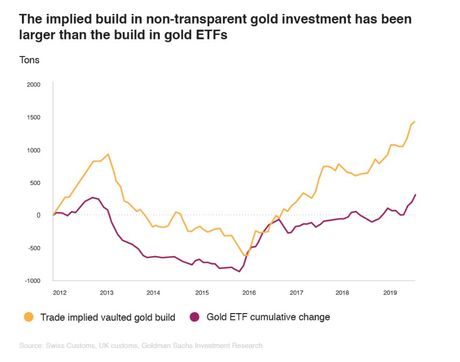
The truth about riches and gold in Serbia: "Everything goes to them. Of course."
News such as that about a huge wealth having been found in southern Serbia, that is, that a Canadian company discovered 19 tons of gold in only one location, once again raises hopes that mining is Serbia' the new "ace up the sleeve."
In Serbia, the richest gold deposits are located in the eastern part of the country, primarily in the vicinity of Bor, Majdanpek, Zajecar and Negotin, but also in the area of Raska and Medvedja.
However, due to several factors, these gold veins are being taken out of our country by foreign companies.
About 25 companies are currently involved in the mining fever, with more than 60 million euros invested last year in ore exploration alone. Assessments say that this figure is much, much higher.
According to unofficial estimates, Serbia sits on almost 300 billion dollars in untapped mineral resources. Taking into account the amount of gold only, we are at number 58 globally.
However, apart from being expensive and time-consuming, field exploration does not mean that the ore extraction will actually begin, because before a mine is opened, it takes years to calculate and analyze whether starting this business is worthwhile. That's one of the reasons why we don't invest on our own.
Thus, our regulations allow foreign companies to explore and exploit gold deposits.
And another question is - well, does the gold under us benefit us in any way?

- Our interest is to achieve certain benefits through mineral rights and through the employment of labor. The biggest benefit would be the supporting industry that future mines rely on. Because, the raw material itself, the concentrate doesn't have some strong value (not only gold, but other raw materials).
The value of the metal only comes to the fore when its concentrate is finalized," Miroslav Ignjatovic, a mining engineer with the Energy and Mining Association, told Telegraf Biznis.
As he stresses, our government would have to provide some incentive funds so that concentrates are not exported. And no law prevents a foreign company from exporting, rather, they are driven solely by economic interest.
Canada-based exploitation firm Medgold Resources, which previously announced that it had found indicators in southern Serbia of rich deposits of precious metals in the area, has now confirmed those results. When asked when concrete benefits could be expected, he says:
"It is still a long way away, detailed geological surveys must be done, so only then can we talk about some exploitation, which further means that it's uncertain. Just remember metal borides - the company that had exploitation rights simply withdrew and the job fell through."
He adds that it is only once the work begins that we can say that the opening of a mine is in sight and that there would be benefits.
Right of use - what exactly does it mean and what it allow them to do?

According to some earlier estimates, the state of Serbia would collect a five percent net income tax for the use of mineral resources through mine exploitation, as well as an additional 15 percent in other taxes.
The right of use is actually the tenders that the new Mining Law links to exploration and exploitation law. That is, a company that did surveys has the advantage of selling the mine itself, that is, the further excavation (in general, of any works).
The old law, Ignjatovic recalls, did not guarantee that, and therefore there was little investment of this type.
"Foreigners didn't see security in finishing the whole job, from exploration to exploitation. Like I said, we can benefit through rent and workers, but everything goes to them. Of course," he says.
"It is well known that the money invested in mining is the slowest to turn a profit. Regardless of modern exploration methods, until everything is rounded up, we don't know what use there is and what the value is," he explains.
He recalls that it is often said that a deposit is rich in various minerals, but sometimes this can have negative effects:
"To get the concentrate you have to separate them, and this technology is often expensive, otherwise, it's simply impossible to separate the minerals. It's good that what's positive about Western companies they continue to apply here, ranging from environmental protection to work safety standards," says Ignjatovic.
In terms of the total area of the territory and the number of inhabitants, we are among the countries rich in mineral resources, but lacking finances and equipment to start production in new deposits.
Compared to the countries in the immediate vicinity, that is, the former Yugoslav republics, Serbia certainly has significantly higher mineral resources and reserves of gold.
In terms of current world production, Serbia ranks 76th, far below Turkey, Finland, Sweden, Bulgaria, Spain...
Jadarit might become a golden export trump card, but that's also "in the pipeline."
Video: Croatia has not a gram, while Serbia is teeming with this metal that is still being fought over
(Vesna Bjelic)
Video: Indira Forza najavila 3 koncerta u mts Dvorani
Telegraf.rs zadržava sva prava nad sadržajem. Za preuzimanje sadržaja pogledajte uputstva na stranici Uslovi korišćenja.

